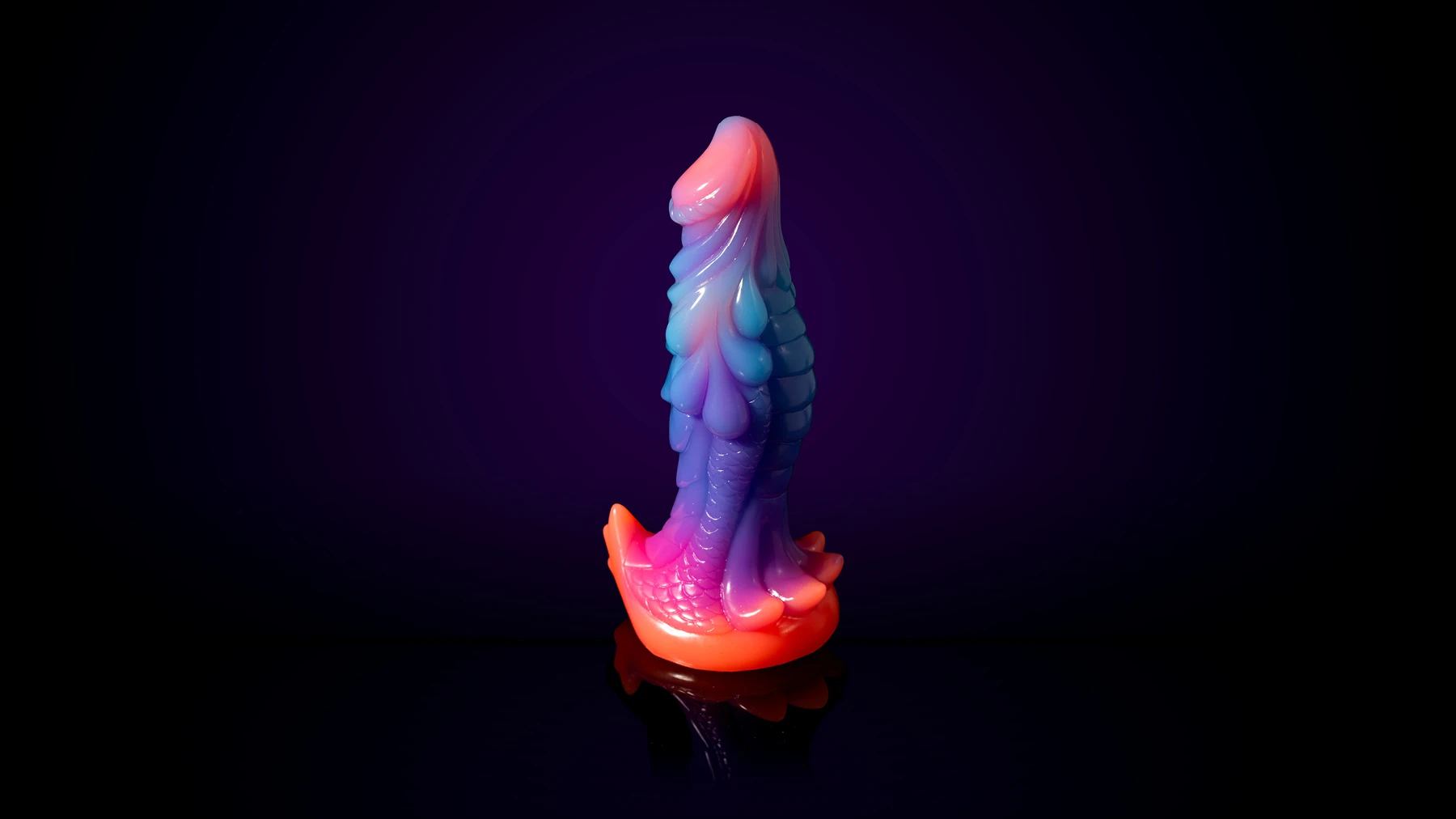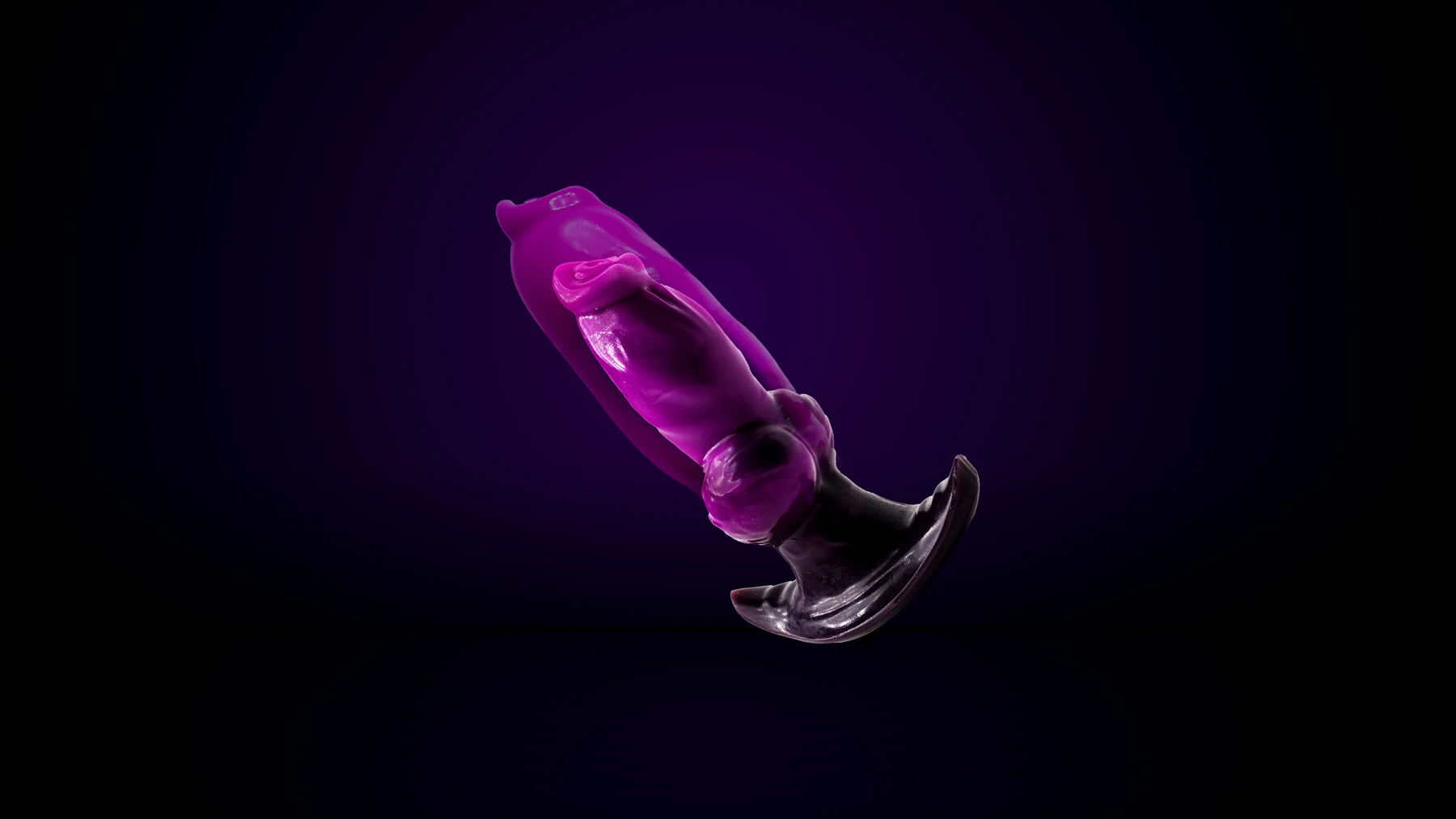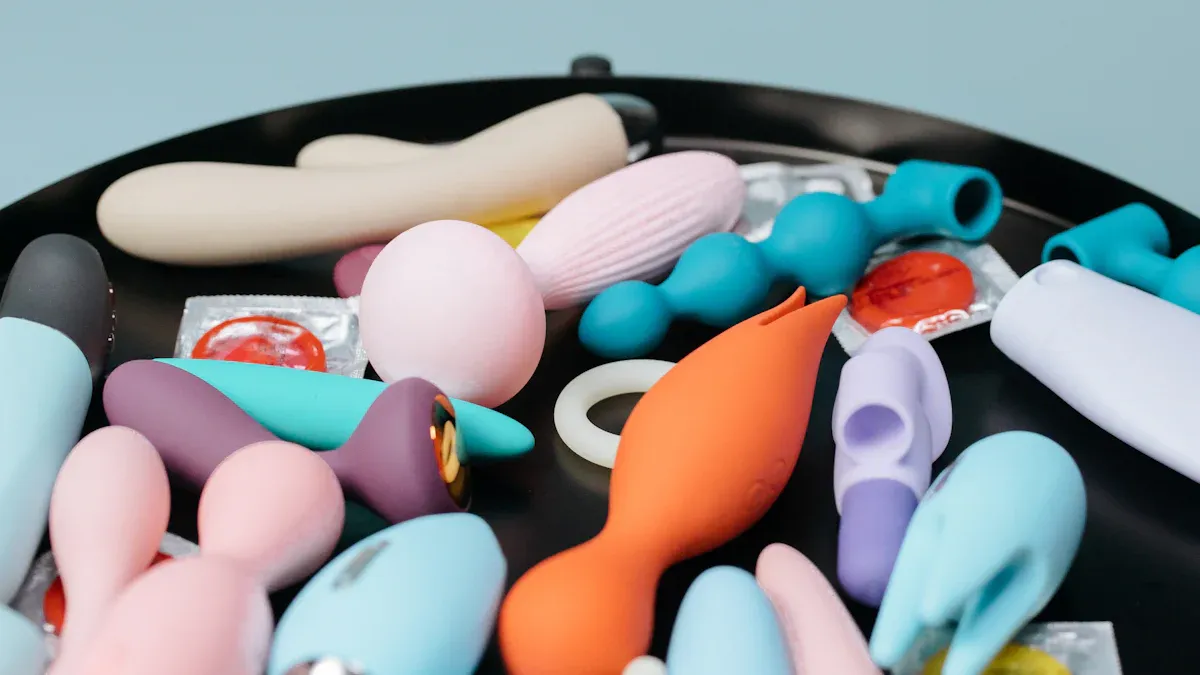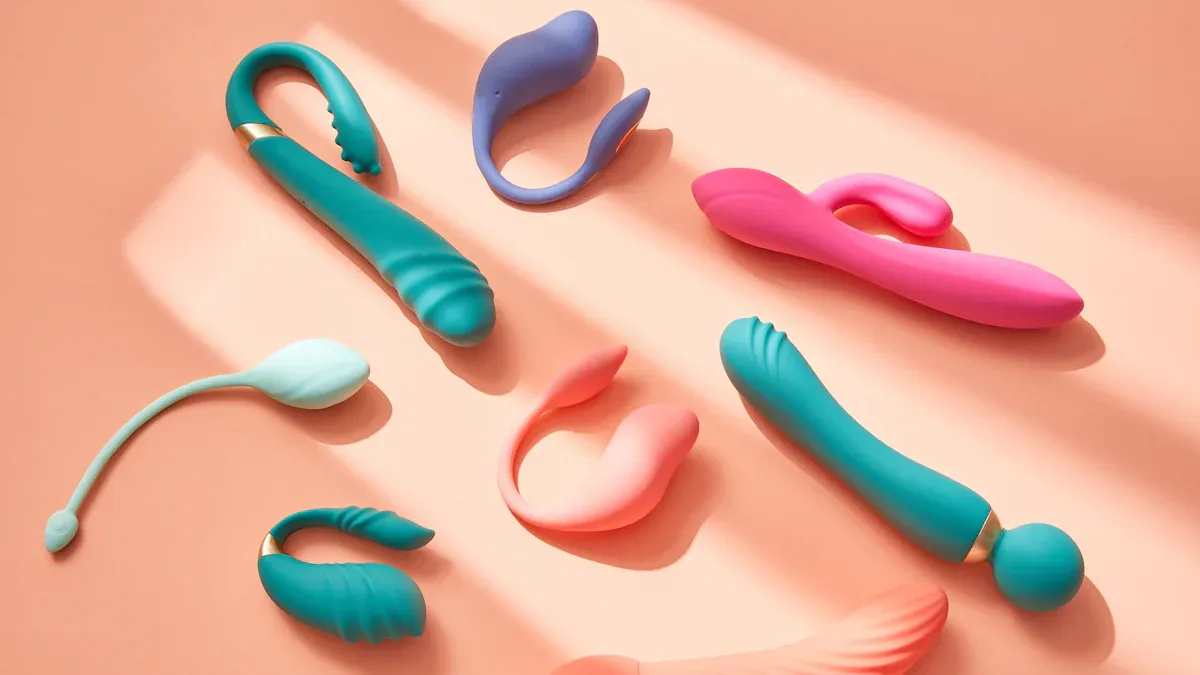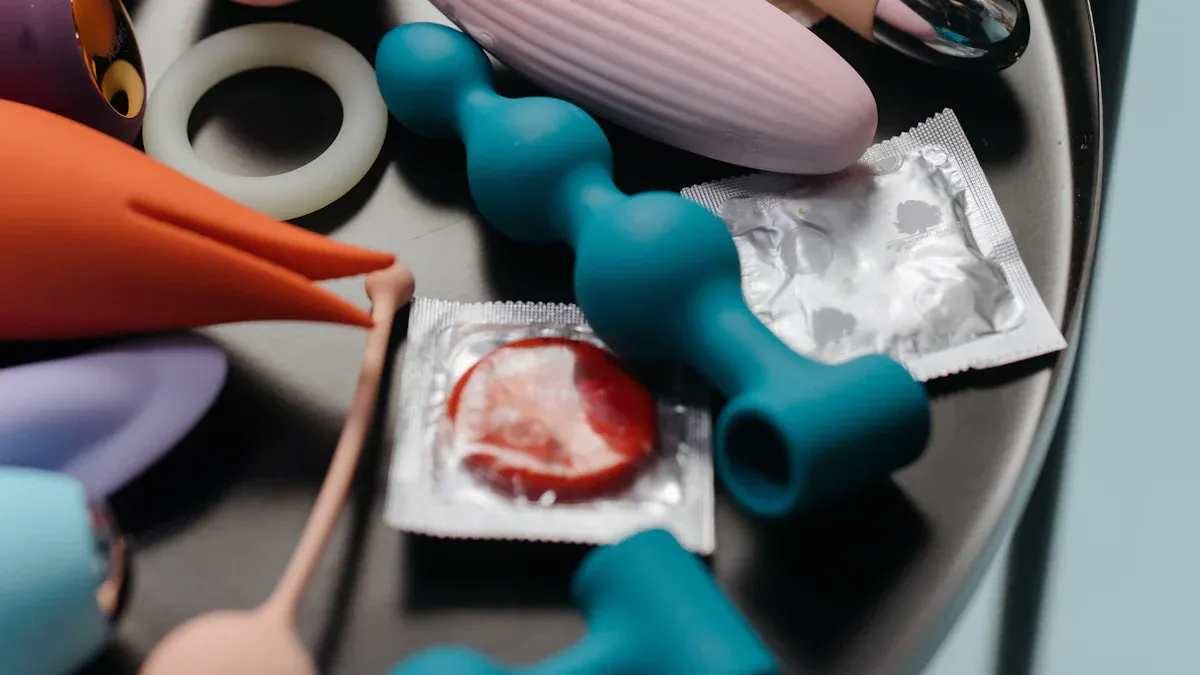PVC vs. Silicone and Glass: Choosing the Right Dildo

Choosing the right dildo material can feel confusing, but it’s important for your safety and cleanliness. Different materials can change how you enjoy using sex toys. Silicone is popular because it’s safe for allergies and easy to clean. Glass is also loved for its beauty and hygiene. PVC dildos, while less liked due to health worries, can still be an option for some. Electric dildos offer a different experience with their vibrating features, while ejaculating dildos provide a unique sensation that mimics real-life experiences. Butt plug dildos can add variety to your collection as well. Picking a dildo isn’t just about the toy itself; it’s about what feels good, lasts long, and keeps you safe. Let’s explore what works best for you!
Why Material Matters for Safe Sex Toys
Picking safe sex toys means choosing the right material. The material affects how it feels, lasts, and impacts your health. Let’s look closer.
Why Safety Is Important in Materials
Safety is key when choosing dildo materials. Silicone and glass are safe because they lack harmful chemicals. PVC may contain phthalates, which can be risky for health.
Studies show some materials, like PET, release harmful chemicals. These chemicals might affect human enzymes and cause health problems.
Experts like Tony Levine, founder of Big Teaze Toys, recommend phthalate-free options. Stores like Babeland teach buyers about safer choices. Research shows phthalates can harm reproductive health.
Evidence Type | Details |
|---|---|
Expert Advice | Tony Levine supports using phthalate-free materials for safety. |
Store Education | Babeland helps customers learn about safer materials. |
Health Concerns | Phthalates linked to cancer and reproductive issues. |
Material Studies | Some sex toys release harmful chemicals, raising safety worries. |
How Materials Affect Durability
Durability matters too. Silicone and glass don’t absorb bacteria, making them easier to clean. They also last longer if cared for properly. PVC is flexible but absorbs bacteria and wears out faster.
Material | Durability Features | Safety Issues |
|---|---|---|
Silicone | Hypoallergenic, non-porous, easy to clean, and long-lasting. | Great for people with allergies or sensitive skin. |
Glass | Strong, smooth, easy to clean, and visually appealing. | Can crack if misused; avoid using cracked glass toys. |
PVC | Stretchy and flexible but porous and less durable. | May irritate skin and cause serious reactions in some users. |
Texture and User Experience
The texture of a dildo changes how it feels to use. Silicone is soft and lifelike, making it popular. Glass is firm and smooth, offering a unique feel. PVC is cheaper but less luxurious.
Glass dildos can be warmed or cooled for temperature play. This adds a fun twist to your experience. Silicone is ideal for those wanting a realistic feel.
Choosing the right material isn’t just about safety or durability. It’s about what feels good to you. Enjoying yourself while staying safe is the ultimate goal.
PVC Dildos: What You Need to Know
Understanding PVC as a Material
PVC is a kind of plastic. It’s used to make cheap dildos. It’s bendy, so it can be shaped easily. This is why many toy makers use it. But, PVC dildos might have phthalates. These are chemicals that make it softer.
Phthalates can leak out over time. This can expose users to bad stuff. Dr. Jane Smith, a scientist, says these chemicals can mess with hormones. They can also affect having babies. PVC dildos are cheap but have health risks. Think about this before buying.
Safety Concerns with PVC Dildos
PVC dildos have safety worries. Phthalates in PVC can cause health problems. These include breast cancer and asthma. They can also mess with hormones. Being around these chemicals a lot can hurt having babies.
Phthalates change hormone levels and block thyroid work. Being around them a lot can lower chances of having babies. It can also cause miscarriages and pregnancy problems.
Tests show PVC toys might have DEHP, DNOP, and DINP. These are banned in the EU because they are harmful.
Findings | Details |
|---|---|
Hazardous Substances Found | Tests found DEHP, DNOP, and DINP in toys. |
Phthalate Content | PVC can have up to 70% phthalates, which are bad. |
Regulatory Concerns | DEHP and other phthalates are banned in the EU over 0.1% by weight. |
If you’re worried, try phthalate-free toys like silicone or glass.
Durability and Maintenance Challenges
PVC dildos are bendy but have tiny holes. This means germs can grow if not cleaned well. Over time, they wear out, making cleaning hard.
Unlike silicone or glass, PVC doesn’t stop germs. It needs extra cleaning and care. If you want a long-lasting and safe dildo, PVC might not be best.
Texture and Affordability
When it comes to texture, PVC dildos have a unique feel. They’re often soft and flexible, which some people enjoy. The surface can be smooth or slightly textured, depending on the design. However, PVC doesn’t have the same luxurious feel as silicone or the sleek smoothness of glass. If you’re looking for something that mimics real skin, PVC might not be your first choice.
Tip: Always check if the PVC dildo has a coating or finish that feels comfortable for you. Some cheaper options might feel sticky or rubbery.
Now, let’s talk about affordability. PVC dildos are some of the most budget-friendly options out there. If you’re new to sex toys or just testing the waters, this can be a great way to start without spending too much. You’ll find plenty of options under $20, which is hard to beat.
Here’s a quick comparison of costs:
Material | Average Price Range | Budget-Friendly? |
|---|---|---|
PVC | $10–$30 | ✅ Yes |
Silicone | $30–$100+ | ❌ Not Always |
Glass | $40–$150+ | ❌ Not Always |
While PVC is easy on the wallet, it’s worth considering the trade-offs. You might save money upfront, but these toys don’t last as long as silicone or glass. Plus, the extra cleaning effort can add up over time.
If you’re on a tight budget, PVC can be a good starting point. Just make sure you’re prioritizing safety and comfort. After all, a good experience doesn’t have to break the bank! 😊
Silicone Dildos: A Safe Choice for Your Body
Why Silicone is Safe for Your Body
Silicone is one of the safest materials for sex toys. It doesn’t have tiny holes where germs can hide. It’s also gentle on sensitive skin and great for people with allergies.
Silicone stays stable and doesn’t release harmful chemicals. Even when you use lubricants or cleaning products, it remains safe. This makes silicone a trusted choice for body-safe toys.
Long-Lasting and Durable
Silicone dildos are strong and last a long time. They don’t absorb germs or moisture, so they stay clean. Unlike PVC, silicone doesn’t wear out quickly.
Manufacturers test silicone to make sure it’s tough. They check how it handles pressure, water, and regular use. These tests show silicone can handle everyday play without breaking down.
Test Type | What It Checks |
|---|---|
Stress Tests | Measures how silicone handles wear and tear. |
Waterproof Tests | Confirms it’s safe to use in water. |
Abrasion Tests | Tracks how much the material wears down over time. |
Flexibility Tests | Ensures silicone keeps its shape after repeated use. |
Chemical Stability | Tests how silicone reacts to lubricants and cleaners. |
With good care, silicone dildos can last for years. They’re worth the money for safety and fun.
Soft Texture and Real Feel
Silicone dildos feel soft and smooth, like real skin. Many people love them for their lifelike texture. Unlike PVC, which can feel sticky, silicone feels silky and flexible.
Surveys show users rate silicone highly for its smooth feel. It doesn’t get greasy or hold bad smells. Silicone is easy to clean and stays fresh for every use.
If you want a realistic and comfy toy, silicone is a great pick! 😊
Cleaning and Maintenance Tips
Taking care of your silicone dildo is super easy. Cleaning it doesn’t take much time, which is why many people love silicone toys. Since silicone is non-porous, it doesn’t hold germs or smells, making it a safe option.
Here’s how you can clean it:
Use warm water and mild soap for a quick clean. This is great for everyday use.
For a deeper clean, boil the toy for 5-10 minutes. This helps kill germs after heavy use.
You can also place it on the top rack of the dishwasher. Skip the soap—hot water works just fine!
These cleaning methods are simple and keep your toy in good shape. Silicone is tough, so it won’t get damaged by these techniques. Just avoid using harsh chemicals or rough cleaners, as they could harm the surface.
After washing, let the toy air dry completely before putting it away. If it stays wet, mold or mildew could grow. Store it in a clean, dry bag or box to keep it dust-free and ready to use.
Cleaning your toy regularly not only keeps it safe but also helps it last longer. Taking a few minutes to care for it makes a big difference. With silicone, maintenance is quick and easy!
Pro Tip: Always read the manufacturer’s cleaning instructions. Some toys might need special care because of their design or finish.
Glass Dildos: A Safe and Special Choice
Why Glass Dildos Are Safe
Glass dildos are very safe for your body. They’re made from strong glass, like borosilicate, which handles pressure and heat well. The glass is nonporous, so germs can’t hide in tiny holes. This makes cleaning easy and keeps them clean.
Always check the glass quality before using it. Good glass is strengthened through a process called annealing. If you see rainbow colors in the glass, it might not be safe. Also, don’t use a toy if it’s chipped or damaged. Safety is super important!
Strong and Hard to Break
Glass dildos are tougher than they look. Borosilicate glass doesn’t crack easily and can handle heat and pressure. Some toys use soda-lime glass, which is even stronger.
I’ve dropped mine a few times, and it didn’t break. Just don’t use it on hard surfaces like tile floors. If you ever see a chip or crack, stop using it right away.
Smooth Feel and Temperature Fun
Glass dildos feel smooth and firm, which is very different from silicone or PVC. You can also heat or cool them for fun temperature play. Warm them under water for a cozy feel or chill them in the fridge for a cool sensation.
These toys are great for experimenting or keeping things simple. They’re not just useful—they’re also really pretty to look at! 😊
Cleaning and Hygiene Benefits
Cleaning glass dildos is a breeze. I love how simple it is to keep them spotless and ready for use. The non-porous surface of borosilicate glass doesn’t absorb liquids or bacteria. This means germs don’t have a chance to hide, making it one of the cleanest options out there. A quick wash with soap and warm water is usually all it takes. For a deeper clean, you can boil it for a few minutes. It’s reassuring to know that sterilizing glass is so straightforward.
Another thing I appreciate is how glass toys are hypoallergenic. If you’ve got sensitive skin like me, this is a big deal. Glass doesn’t irritate or cause allergic reactions, so you can enjoy it without worrying about discomfort. It’s a material that feels safe and reliable every time.
When it comes to hygiene, glass dildos really shine. They don’t hold onto odors or stains, and they stay fresh even after repeated use. I’ve found that storing them is just as easy. After cleaning, I let mine air dry completely and then tuck it away in a soft pouch. This keeps it dust-free and ready for the next time.
If you’re someone who values cleanliness and safety, glass is a fantastic choice. It’s not just about how easy it is to clean—it’s about knowing you’re using something that’s truly hygienic. That peace of mind makes all the difference.
Tip: Always inspect your glass toy for chips or cracks before cleaning. Damaged glass can be unsafe, so it’s better to replace it if needed.
Comparing PVC, Silicone, and Glass Dildos
Safety and Health Considerations
The material of your dildo is very important for safety. Silicone and glass are great choices because they don’t trap germs. Both are non-porous, making them clean and safe to use. Silicone is also hypoallergenic, so it’s good for sensitive skin. It doesn’t have harmful chemicals, which makes it safer for your body.
PVC is different and can be risky. Many PVC toys have phthalates, which are chemicals that make them soft. These chemicals can leak out and cause health problems. If you pick PVC, look for ones labeled phthalate-free. Even then, silicone or glass is a better choice for safety.
Tip: Always read labels to check if the toy is body-safe. Your health matters!
Durability and Longevity
How long a dildo lasts depends on its material. Silicone and glass last much longer than PVC. Silicone is strong and doesn’t wear out easily. Glass, especially borosilicate glass, is tough and handles heat and pressure well.
PVC breaks down faster, especially in sunlight or heat. Some chemicals can make PVC stronger, but it’s still not as durable as silicone or glass. Silicone reacts differently to sunlight. UVA light can make it stronger, while UVB light might weaken it a little. This makes silicone a smart choice for long-term use.
If you want a toy that lasts for years, pick silicone or glass. They cost more upfront but save money over time because they don’t need replacing often. PVC is cheaper but wears out faster, which can cost more later.
Texture and User Experience
The feel of a dildo changes how much you enjoy it. Silicone feels soft and lifelike, which many people love. It’s flexible but firm, making it comfortable to use. Silicone also warms up quickly, adding to its realistic feel.
Glass feels smooth and firm, offering a unique experience. You can heat or cool it for fun temperature play. This makes glass exciting and different from other materials.
PVC is softer and more bendable than glass but doesn’t feel as nice as silicone. Some PVC toys feel sticky or rubbery, which might not be enjoyable. PVC is good if you’re on a budget, but it doesn’t offer the same high-quality feel as silicone or glass.
Note: Choose what feels best for you. Whether you like silicone’s softness, glass’s firmness, or PVC’s affordability, your comfort matters most.
Cleaning and Maintenance
Keeping your dildos clean is super important for staying healthy. Different materials need different cleaning methods, and some are easier to care for than others. Let’s break it down simply:
Silicone: Silicone is very easy to clean. It doesn’t hold germs or smells because it’s non-porous. Wash it with warm water and mild soap after each use. For a deeper clean, you can boil it for a few minutes or put it on the top rack of your dishwasher (no soap needed). Silicone is also gentle on sensitive skin, making it a great choice. It’s one of the easiest materials to maintain, which is why many people love it.
Glass: Glass dildos are just as simple to clean as silicone ones. They don’t trap bacteria because they’re non-porous too. Wash them with soap and water, or sanitize them by boiling or using a toy cleaner. Always check for cracks or chips before cleaning, as damaged glass can be unsafe. High-quality glass, like borosilicate, is the safest option.
PVC: PVC is harder to clean because it’s porous. This means bacteria can hide in tiny holes on its surface. To make it safer, use a condom over PVC dildos. When cleaning, use warm water and soap, but know it won’t be as hygienic as silicone or glass. PVC requires more effort to maintain, and it doesn’t give the same peace of mind.
Tip: Always let your toys dry completely before storing them. If they stay wet, mold or mildew can grow, especially on porous materials like PVC.
When it comes to cleaning, silicone and glass are the best choices. They’re not only safe but also super easy to keep clean, making them enjoyable to use.
Cost and Affordability
Let’s talk about prices. Picking the right dildo isn’t just about safety or feel—it’s also about what fits your budget. Here’s a simple breakdown of costs for different materials:
Material | Key Features | Affordability Level |
|---|---|---|
Silicone | Safe, hypoallergenic, durable, easy to clean, flexible | Medium to High |
Rubber | Cheap, bendable, but less safe and doesn’t last long | Low |
Plastic | Affordable, sturdy, easy to clean, good for beginners | Low |
Glass | Fancy, beautiful, temperature-friendly, safe for long-term use | High |
Other Materials | Metals, ceramics, or special materials for unique designs | Varies |
Silicone dildos cost more but are worth it. They last a long time, feel great, and are very safe for your body. Glass dildos are more expensive, but they’re like luxury items—strong, stylish, and unique. If you want something special, glass is a great pick.
PVC dildos are the cheapest option. You can find them for as little as $10, which is good if you’re new to sex toys or just trying them out. But they don’t last as long and need more cleaning effort. Over time, you might spend more on replacements or cleaning supplies.
Note: While saving money is important, don’t ignore safety. Spending a little more on silicone or glass can protect your health and give you a better experience.
If you’re on a tight budget, PVC can work as a short-term choice. But if possible, save up for silicone or glass. They’re safer, last longer, and are better for your body in the long run.
Choosing the Right Dildo Material for You
Thinking About Safety and Comfort
When picking a dildo, safety and comfort are very important. Always ask yourself: Is the material safe for my body? Will it feel good to use? These are key questions, but there’s more to think about.
Here are some tools to help you decide:
Tool | What It Does |
|---|---|
Material Safety Tests | Checks if the material is safe and won’t irritate skin. |
Usability Tests | Looks at how easy and comfortable the toy is to use. |
Durability Tests | Makes sure the toy lasts and works well over time. |
Lubricant Compatibility | Tests how the material reacts with different lubricants. |
User Reviews | Shares real experiences to improve design and comfort. |
Silicone dildos are a top choice for safety and comfort. They’re gentle on skin, non-porous, and great for people with allergies. Glass dildos are also a good pick because they’re smooth and simple to clean. PVC dildos can be risky since they might have phthalates. If you choose PVC, make sure it’s labeled phthalate-free.
Comfort matters too. Silicone feels soft and realistic, while glass is firm and smooth. Both materials offer great experiences, but it’s all about what feels best for you.
Tip: Not sure where to start? Try a silicone dildo. It’s safe, easy to use, and works well for most people.
Cleaning and Maintenance
Keeping your dildo clean is super important for staying healthy. Always clean it before and after use. Different materials need different cleaning efforts, so think about how much time you want to spend on care.
Here’s what I’ve learned about cleaning:
Porous toys like PVC need extra cleaning because germs can hide in them.
Always wash a new toy before using it for the first time.
Clean your toy before and after every use, especially if switching between areas.
Even if unused for a while, give it a quick clean before using again.
Silicone and glass dildos are the easiest to clean. Silicone doesn’t trap germs or smells. Wash it with warm water and soap, or boil it for a deeper clean. Glass is just as easy—wash it with soap or sanitize it by boiling.
PVC dildos take more work. Their porous surface makes them harder to clean well. If you use PVC, try covering it with a condom to keep it cleaner.
Note: Regular cleaning keeps your toys safe and helps them last longer. Silicone and glass are great if you want easy-to-clean options.
Balancing Cost and Value
Price matters when picking a dildo, but think about long-term value too. Spending more upfront can save money later.
Here’s a simple cost comparison:
Material | Price Range | Benefits |
|---|---|---|
Silicone | $40 – $100+ | Safe, easy to clean, lasts long, resists germs. |
Metal | $50 – $200+ | Hypoallergenic, durable, luxury feel, lasts for years. |
Glass | $30 – $100+ | Strong, non-porous, good for temperature play, easy to clean. |
TPE/TPR | Under $40 | Soft feel, but porous and harder to clean. |
PVC/Plastic | Varies | Cheap but may have harmful chemicals and wears out faster. |
Latex | Varies | Stretchy, but not good for people with allergies. |
Silicone and glass cost more but are worth it. They last longer, need less cleaning, and feel better to use. PVC is cheaper but wears out faster and needs more care.
If you’re on a budget, PVC might seem like a good choice. But saving up for silicone or glass is smarter. They’re safer, stronger, and better for your body over time.
Tip: Think of your dildo as an investment in your health and happiness. Spending more now can save you trouble later.
Exploring Different Materials to Find Your Preference
When it comes to picking the right material for your dildos, it’s all about finding what works best for you. Everyone has different preferences, and that’s okay. I’ve tried a few materials myself, and I can tell you, each one offers something unique. Let’s explore how you can figure out what suits you best.
Start with What Feels Right
The first thing I always recommend is thinking about how you want your dildo to feel. Do you like something soft and lifelike? Silicone might be your go-to. It’s smooth, flexible, and feels incredibly natural. Many people love it because it mimics real skin. Plus, it’s body-safe and hypoallergenic, so you don’t have to worry about irritation.
If you’re into something firmer and more solid, glass could be your thing. It’s sleek, smooth, and offers a completely different experience. You can even play with temperature—warm it up or cool it down for added fun. Glass dildos are also body-safe and super easy to clean, which is a big win in my book.
PVC, on the other hand, is softer and more affordable. It’s a good starting point if you’re new to sex toys. But keep in mind, it’s not as durable or hygienic as silicone or glass. If you go for PVC, make sure it’s labeled phthalate-free to avoid harmful chemicals.
Consider Your Lifestyle
Your lifestyle plays a big role in choosing the right material. Are you someone who values convenience? Silicone and glass are both low-maintenance options. Silicone dildos can be cleaned with soap and water or even boiled for a deeper clean. Glass is just as easy—wash it, sanitize it, and you’re good to go.
If you’re on a tight budget, PVC might seem appealing. It’s cheaper upfront, but it requires more effort to keep clean. Over time, you might find yourself replacing it more often, which can add up. For me, investing in a high-quality silicone or glass dildo has always been worth it. They last longer and save me the hassle of constant replacements.
Listen to What Others Are Saying
I’ve noticed a growing trend in the adult toy market. More people are choosing body-safe materials like silicone, glass, and even stainless steel. This shift comes from increased awareness about health risks linked to certain materials. Nobody wants to deal with harmful chemicals or skin irritation, right? That’s why non-toxic and hypoallergenic options are becoming so popular.
If you’re unsure, check out reviews or ask for recommendations. Hearing about other people’s experiences can help you make a more informed choice. I’ve found that user reviews often highlight things I wouldn’t have thought of, like how a material feels during use or how easy it is to clean.
Experiment and Have Fun
At the end of the day, finding your favorite material is all about experimenting. Don’t be afraid to try different options. Start with silicone if you want something safe and versatile. Move on to glass if you’re curious about a firmer feel or temperature play. If you’re on a budget, PVC can be a good way to test the waters.
Remember, there’s no right or wrong choice here. It’s all about what makes you feel good and comfortable. Take your time, explore, and enjoy the process. After all, the journey to finding the perfect dildo is half the fun! 😊
Pro Tip: If you’re still unsure, start with a silicone dildo. It’s a safe, reliable option that works well for most people.
Picking the right dildo material depends on safety, durability, and feel. Here’s a simple comparison to guide you:
Material | Safety Issues | Durability | How It Feels |
|---|---|---|---|
PVC | Can have harmful chemicals | Wears out quickly | Cheap, bendy, and lightweight |
Silicone | Safe for skin, no chemicals | Long-lasting, soft texture | Feels real, smooth, and comfy |
Glass | Hypoallergenic, germ-free | Strong but can break | Firm, smooth, and fun for temperature play |
Always choose safety and comfort first. Silicone and glass are great for lasting use and feeling secure. PVC is okay if you’re saving money, but it needs more care. Think about what’s most important to you and pick wisely. Your safety and happiness should always come first! 😊
